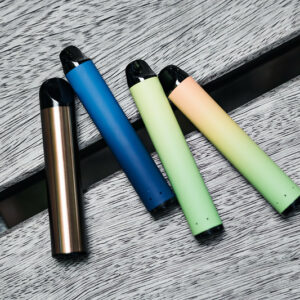Disposable e-cigarettes have recently come into the crosshairs of regulators. For example, Arizona state senator T.J. Shope has introduced legislation targeting the flood of flavored vapes from China. There are proposed measures at the federal level for the Food and Drug Administration to crack down on “illegal vapes.”
Why is China exporting so many e-cigarettes to the United States in the first place?
The FDA’s restriction on flavored e-cigarettes left a void in the vaping market because of the popularity of the devices. Not only is non-tobacco-flavored e-juice more appealing, but it has been crucial in helping adults quit smoking by breaking the connection between tobacco and nicotine.
Makers of single-use vaping devices found loopholes around the FDA’s ban, supplying the product that has helped many smokers ditch cigarettes.
Even though Public Health England found e-cigarettes to be “95 percent safer than conventional cigarettes,” there is still panic over the effect of nicotine on the developing brain.
The calls to save youths from the dangers of nicotine-laden bubblegum vapor might be a laudable cause. In the tradition of Bruce Yandle’s “Bootleggers and Baptists,” various interest groups are looking to capitalize on banning imported vapes. Hiding underneath the veneer of protecting kids from addiction is an undercurrent.
The United States should cease strict enforcement of the ban on Chinese disposable vapes because it will reward domestic industries, perpetuate protectionist policies and harm millions of Americans trying to quit cigarettes.
The United States should cease strict enforcement of the ban on Chinese disposable vapes because it will reward domestic industries, perpetuate protectionist policies and harm millions of Americans trying to quit cigarettes.
Protecting kids from foreign mango-flavored e-cigarettes might seem pressing. We are bombarded with stories of teens developing health conditions purportedly linked to vaping. But all the alarmist headlines ignore the fact that teen vaping is declining.
Despite the waning popularity among high schoolers, domestic companies selling nicotine products support ramped-up enforcement.
Considering the immense competition from foreign producers, Altria has a motive to endorse measures that eliminate them from the market. The tobacco titan launched lawsuits against disposable e-cigarette makers shirking the flavor ban. Altria has been outspoken about the dominance of flavored Chinese vapes in the market. The CEO said that the market has been “overrun” by imported disposables.
Altria has backed initiatives by states to restrict sales of foreign disposable vapes. Since it is losing market share to these products, it takes time to take its concerns seriously. Public health concerns are not what is pressing domestic tobacco companies to call for stricter enforcement. The American nicotine industry is trying to combat a wave of foreign competition.
Lawmakers are encouraging this covert behavior. All at the expense of vapers.
Not only are business interests looking to benefit from restrictions on disposable vapes, but elected officials also stand to gain. Political leaders can seize this opportunity to perpetuate protectionist policies to stay in office, not improve public health. Over the years, China has been a popular target for politicians. The Trump administration launched a “trade war” with China, fraying trade relations.
Public demand is behind much of the anti-Chinese sentiment. In a 2023 Pew poll, 83 percent of American adults viewed China negatively, and 44 percent held “very unfavorable views.” The current geopolitical climate makes anything related to China a soft target. Combined with “hysteria” over youth vaping, policies against Chinese disposables have a lot of currency.
A few politicians who are tough on China have jumped on the bandwagon. Sen. Marco Rubio, R-Fla., has blamed China for America’s “social and economic ills.”Rubio recently introduced a bill to increase the tariffs on Chinese automobiles.
Rubio also called for the FDA to step up enforcement against the importation of flavored e-cigarettes from China. He is capitalizing on the image of China poisoning our youth with vaping products and stressing the importance of saving children from “high nicotine” and “fentanyl” tainted vapes. These are flimsy justifications for banning smoking-cessation tools. Teen vaping is declining, and popular manufacturers are taking measures against counterfeiters.
Political and commercial interests prosper by restricting imports while vapers suffer. Vaping is an effective form of smoking cessation. A study published by the New England Journal of Medicine found that when combined with smoking-cessation counseling, e-cigarettes helped participants abstain from tobacco. The study found that 59.6 percent of the participants using vapes discontinued tobacco use versus only 20.1 percent who went cold turkey.
The flavors make vaping effective in helping smokers quit. Another study by CoEHAR found that tobacco-flavored vapes had only a 15 percent success rate in helping smokers quit.
Clamping down on the only source of flavored vaping products, many Americans will remain smokers. This crackdown will have a devastating effect on public health. E-cigarettes contain fewer toxic chemicals and biomarkers than exposure to cigarette smoke. The risk of cardiovascular conditions among smokers who switched to vaping decreased because it lessened the narrowing of their arteries.
Protecting kids from nicotine addiction is a noble objective. But railing against foreign e-cigarette companies making a product that helps adults quit smoking is not the answer. Commercial and political interests have benefited from weaponizing the influx of Chinese devices. Tobacco companies and politicians do so at the expense of vapers. It is vapers who bear the costs of enforcing the flavor ban.


